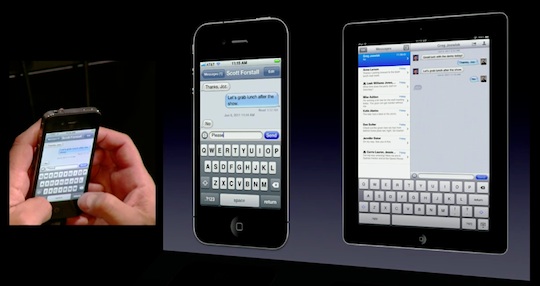 SMS was an ingenious idea. It allowed people to relay messages to each other within seconds. It also started in Finland – and it might end there too. This past Christmas Eve, the Finns sent a mere 8.9 million text messages compared to 10.9 million in 2010. At that rate, SMS could become obsolete within five years – or less. Why? Because there are now major alternatives like email, Google Voice, social media, and most importantly, iMessage.
SMS was an ingenious idea. It allowed people to relay messages to each other within seconds. It also started in Finland – and it might end there too. This past Christmas Eve, the Finns sent a mere 8.9 million text messages compared to 10.9 million in 2010. At that rate, SMS could become obsolete within five years – or less. Why? Because there are now major alternatives like email, Google Voice, social media, and most importantly, iMessage.
When Steve Jobs introduced iMessage at WWDC 2011, everyone wondered if this was just another “thing.” Was Apple just testing the SMS waters to check the temperature, or was this something different? I thought the latter. I predicted that iMessage would follow the same pattern as Game Center; sound cool at first, die down after two weeks, and explode after two months. I was right to an extent, but I overlooked one important fact. iMessage was literally built-in to the OS. That meant that you didn’t have to do anything to get it working – it just worked. When you’d message an iOS device, you’d see blue and when you send a text via SMS to those other phones, you’d see green. Before I knew it, I began seeing less and less green. I cut my messaging plan from unlimited to 1400 and even started iMessaging email addresses. Now there’s word of iMessage coming to the Mac. Carriers? Beware.
It seems that the cellular giants like AT&T, Verizon, Sprint, and the rest are sitting back in their seats saying, “no biggie.” Wrong. Yes biggie. In fact, the SMS industry, which accounts for 20 percent of carrier revenue, is slipping faster than they think. Christmas day in Hong Kong saw a 14 percent drop in text messages. The Netherlands and the Philippines weren’t far off either. These were some of the countries that hopped on the SMS bandwagon early on in the 90s. So what do the carriers respond with? “You still need our 3G/4G.” Okay, that may hold true with iPhones, but not with iPod touches, iPads, or Macs. In fact, a study found 95 percent of iPads and other tablets use Wi-Fi connections instead of cellular providers. In other words, carriers aren’t so big and bad anymore.
This is the main point. Ten years ago, SMS was it. There wasn’t really an alternative. Ten years later, we have more alternatives than I have fingers and toes. A good bit of them are pretty useful too. iMessage, Google Voice, Facebook’s thingy, and others are giving us what we want with no strings or costs attached. Not to mention, they work flawlessly. My advice to the carriers? Look for ways to fill up that 20 percent of revenue because if you don’t, it will be nonexistent in five years – or less.
Via: CultofMac






